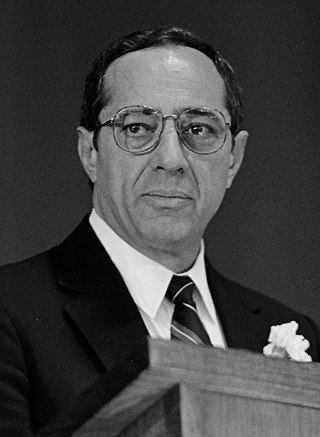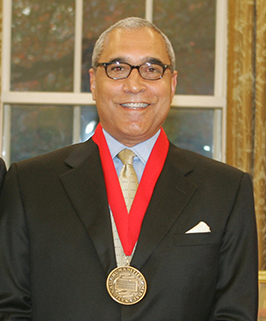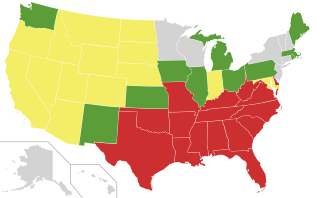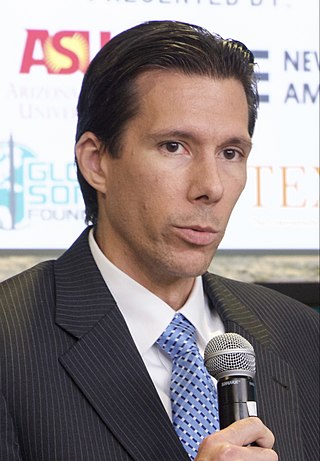Related Research Articles

Mario Matthew Cuomo was an American lawyer and politician who served as the 52nd governor of New York for three terms, from 1983 to 1995. A member of the Democratic Party, Cuomo previously served as the lieutenant governor of New York from 1979 to 1982 and the secretary of State of New York from 1975 to 1978. He was the father of former New York governor Andrew Cuomo and NewsNation anchor Christopher Cuomo.

John J. Farmer Jr. is an American author, lawyer, politician, and jurist. He is the director of the Eagleton Institute of Politics, where he also leads the Miller Center for Community Protection and Resilience (CPR). He served as acting governor of New Jersey for 90 minutes on January 8, 2002, by virtue of his status as New Jersey Attorney General.

Percy Ellis Sutton was an American political and business leader. An activist in the Civil Rights Movement and lawyer, he was also a Freedom Rider and the legal representative for Malcolm X. He was the highest-ranking African-American elected official in New York City when he was Manhattan borough president from 1966 to 1977, the longest tenure at that position. He later became an entrepreneur whose investments included the New York Amsterdam News and the Apollo Theater in Harlem.
Carmen Twillie Ambar is an American attorney, academic, and the current president of Oberlin College in Ohio. She was appointed to the post in May 2017.
In United States politics, modern liberalism, a form of social liberalism, is one of two current major political ideologies. It combines ideas of civil liberty and equality with support for social justice. Economically, modern liberalism supports government regulation on private industry, opposes corporate monopolies, and supports labor rights. Its fiscal policy opposes any reduction in spending on the social safety net, while simultaneously promoting income-proportional tax reform policies to reduce deficits. It calls for active government involvement in other social and economic matters such as: reducing economic inequality, increasing diversity, expanding access to education and healthcare, regulating economic activity, and environmentalism. Modern liberalism was formed in the 20th century in response to the Great Depression. Major examples of modern liberal policy programs include the New Deal, the Fair Deal, the New Frontier, the Great Society, the Affordable Care Act, and the Infrastructure Investment and Jobs Act.
Liberalism in the United States is based on concepts of unalienable rights of the individual. The fundamental liberal ideals of freedom of speech, freedom of the press, freedom of religion, the separation of church and state, the right to due process, and equality before the law are widely accepted as a common foundation of liberalism. It differs from liberalism worldwide because the United States has never had a resident hereditary aristocracy, and avoided much of the class warfare that characterized Europe. According to American philosopher Ian Adams, "all U.S. parties are liberal and always have been. Essentially they espouse classical liberalism, that is a form of democratised Whig constitutionalism plus the free market. The point of difference comes with the influence of social liberalism and the proper role of government."

Shelby Steele is an author, columnist, documentary film maker, and a Robert J. and Marion E. Oster Senior Fellow at Stanford University's Hoover Institution. He specializes in the study of race relations, multiculturalism, and affirmative action.
The Democratic Party of the United States is a big tent party composed of various factions. The liberal faction supports modern liberalism and social liberalism that began with the New Deal in the 1930s and continued with both the New Frontier and Great Society in the 1960s. The moderate faction supports Third Way politics that includes center-left social policies and centrist fiscal policies. The progressive faction supports social democracy and left-wing populism.
Adolph Leonard Reed Jr. is an American professor emeritus of political science at the University of Pennsylvania, specializing in studies of issues of racism and U.S. politics.
Multiracial Americans or mixed-race Americans are Americans who have mixed ancestry of two or more races. The term may also include Americans of mixed-race ancestry who self-identify with just one group culturally and socially. In the 2020 United States census, 33.8 million individuals or 10.2% of the population, self-identified as multiracial. There is evidence that an accounting by genetic ancestry would produce a higher number.

The Southern Regional Council (SRC) is a reform-oriented organization created in 1944 to avoid racial violence and promote racial equality in the Southern United States. Voter registration and political-awareness campaigns are used toward this end. The SRC evolved in 1944 from the Commission on Interracial Cooperation. It is headquartered in Atlanta, Georgia.

In the United States, many U.S. states historically had anti-miscegenation laws which prohibited interracial marriage and, in some states, interracial sexual relations. Some of these laws predated the establishment of the United States, and some dated to the later 17th or early 18th century, a century or more after the complete racialization of slavery. Nine states never enacted anti-miscegenation laws, and 25 states had repealed their laws by 1967. In that year, the U.S. Supreme Court ruled in Loving v. Virginia that such laws are unconstitutional under the Fourteenth Amendment to the U.S. Constitution.

Paul D. Miller is an American academic, writer and former White House staffer for Presidents George W. Bush and Barack Obama. He is a professor in the Practice of International Affairs at Georgetown University's School of Foreign Service. He is a former associate director of The William P. Clements Jr. Center for National Security at the University of Texas at Austin. He formerly worked as an adjunct political scientist at the RAND Corporation. He is a reserve Army officer and veteran of the War in Afghanistan. Miller's writing has appeared in Foreign Affairs, The Washington Post, The American Interest, World Affairs, The Washington Quarterly, War on the Rocks, and elsewhere.

The Tappan Zee Bridge, officially named the Governor Mario M. Cuomo Bridge after the former New York governor, is a twin cable-stayed bridge spanning the Tappan Zee section of the Hudson River between Tarrytown and Nyack in the U.S. state of New York. It was built to replace the original Tappan Zee Bridge opened in 1955, which was located just to the south. The bridge's north span carries the northbound and westbound automobile traffic of the New York State Thruway, Interstate 87 (I-87) and I-287; it also carries a shared use path for bicycles and pedestrians. The south span carries southbound and eastbound automobile traffic.

Jewell Jackson McCabe is an American feminist, business executive, social and political activist. She was a leader of, and spokesperson for, the National Coalition of 100 Black Women's movement in the mid to late 1970s in New York City and for the national movement throughout the United States in the early 1980s into the 1990s, as founder of the organization which grew out of her New York City stewardship. In 1993 she became the first woman in 84 years to be in serious contention for the presidency of the civil rights organizations NAACP. Distinguished as an activist Jewell collaborated with several leading African American women leaders of varied and often opposing political ideologies who had in common their opposition to the million man march for excluding black women, including Angela Davis.
Stephen Tuck is a British historian. He is a fellow of Pembroke College, Oxford, where he is a Professor of Modern History, focusing on the history of the United States. He is the author of three books about the Civil Rights Movement, and the co-editor of a fourth book about the same topic.

A Tale of Two Cities was a speech delivered by New York Governor Mario Cuomo on July 16, 1984, at the Democratic National Convention in San Francisco, California. The speech galvanized the convention; it was watched on television by nearly 80 million people and received copious attention in the media. Less than halfway through his first term as governor, Cuomo was widely celebrated for the speech, and he took on new political cachet as a Democratic leader on a national scale.
Patrick J. Deneen is an American political theorist, author, and public intellectual, who serves as a professor of political science at the University of Notre Dame. In 2018, he came to prominence with the publishing of his book, Why Liberalism Failed.

Juliet Hooker is a Nicaraguan-born political scientist who currently holds the Royce Family Professorship of Teaching Excellence in Political Science at Brown University. She is a political philosopher who focuses on racial justice, the theory of multiculturalism, and the political thought of the Americas.

Eric Anthony Abrahams was a Jamaican public servant and broadcaster. He was director of tourism from 1970 to 1975, and minister of tourism and information from 1980 to 1984. After leaving office, he co-created a radio show with Beverley Manley, "The Breakfast Club". He was involved in a libel suit against the Gleaner Company, which initially resulted in a major settlement to him. Abrahams was educated at Jamaica College and later at the University of the West Indies and University of Oxford. At Oxford, he was elected president of the Oxford Union, a debating society. In 1964, he hosted a debate attended by Malcolm X. In Britain, he briefly worked for the BBC as its first black TV reporter.
References
- ↑ "Eagleton Faculty, Staff and Visiting Associates: Saladin Ambar". eagleton.rutgers.edu. Rutgers University. Retrieved March 22, 2024.
- ↑ "Saladin Ambar". bas.georgetown.edu. Georgetown University. Retrieved March 22, 2024.
- ↑ Germain, Felix (Winter 2014). "Malcolm X at Oxford Union: Racial Politics in a Global Era". Political Science Quarterly. 129 (4): 736–738. doi:10.1002/polq.12265.
- ↑ Corrigan, Lisa (November 30, 2016). "Malcolm X at Oxford Union: Racial Politics in a Global Era by Saladin Ambar (review)". Rhetoric & Public Affairs. 19 (1): 147–150. doi:10.14321/rhetpublaffa.19.1.0147 – via Project MUSE.
- ↑ "Malcolm X at Oxford Union: Racial Politics in a Global Era by Saladin Ambar". Publishers Weekly.
- ↑ "Stars and Shadows: The Politics of Interracial Friendship from Jefferson to Obama by Saladin Ambar". Publishers Weekly.
- ↑ Hawley, Michael (September 30, 2018). "Saladin Ambar. American Cicero: Mario Cuomo and the Defense of American Liberalism . Oxford: Oxford University Press, 2017. Pp. ix+224. $29.95". American Political Thought. 7 (4): 683–687. doi:10.1086/699862. S2CID 159407437 – via CrossRef.